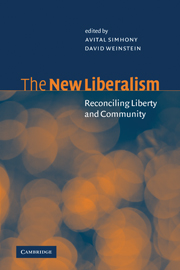Book contents
- Frontmatter
- Contents
- List of contributors
- Acknowledgments
- Introduction: The new liberalism and the liberal–communitarian debate
- 1 Liberal community: an essay in retrieval
- 2 T. H. Green on individual rights and the common good
- 3 T. H. Green's complex common good: between liberalism and communitarianism
- 4 Private property, liberal subjects, and the state
- 5 Neutrality, perfectionism, and the new liberal conception of the state
- 6 Bosanquet's communitarian defense of economic individualism: a lesson in the complexities of political theory
- 7 The new liberalism and the rejection of utilitarianism
- 8 Staunchly modern, non-bourgeois liberalism
- 9 The new liberalism and citizenship
- Select bibliography
- Index
4 - Private property, liberal subjects, and the state
Published online by Cambridge University Press: 06 July 2010
- Frontmatter
- Contents
- List of contributors
- Acknowledgments
- Introduction: The new liberalism and the liberal–communitarian debate
- 1 Liberal community: an essay in retrieval
- 2 T. H. Green on individual rights and the common good
- 3 T. H. Green's complex common good: between liberalism and communitarianism
- 4 Private property, liberal subjects, and the state
- 5 Neutrality, perfectionism, and the new liberal conception of the state
- 6 Bosanquet's communitarian defense of economic individualism: a lesson in the complexities of political theory
- 7 The new liberalism and the rejection of utilitarianism
- 8 Staunchly modern, non-bourgeois liberalism
- 9 The new liberalism and citizenship
- Select bibliography
- Index
Summary
Despite the significant and much discussed differences between Rawls' and Nozick's accounts of property rights, these thinkers' property theories have at least two common features. First, in sharp contrast to many other statements of liberal political theory, neither Rawls nor Nozick make individual rights to private property a necessary requirement of a just society. It has been observed that private property rights occupy a contingent position in Rawls' scheme of things, while Nozick makes them a matter of historical accident rather than a moral necessity. Second, both of these writers think that entitlements can be treated in purely individualistic terms. Although Nozick's claim that just holdings are products of transactions determined solely by rightholders reflects this perspective most clearly, it is also present in Rawls' account of the original position. Rawls holds that objects are available for distribution in this situation because individuals have no legitimate claims upon them: they do not deserve them. An implication of this argument is that if individuals did deserve these possessions, they would not be available for distribution. People either deserve things, in which case their hold upon them would be as tenacious as that of Nozick's bearers of natural rights, or they are not deserved at all and thus fall into a common pool whence they can be doled out on the basis of an acceptable principle of distribution.
The new liberal thinkers who will be discussed here (T. H. Green, Bernard Bosanquet, L. T. Hobhouse, and J. A. Hobson) argued that some form of private property is a necessary condition for liberal subjects.
- Type
- Chapter
- Information
- The New LiberalismReconciling Liberty and Community, pp. 92 - 114Publisher: Cambridge University PressPrint publication year: 2001
- 2
- Cited by



